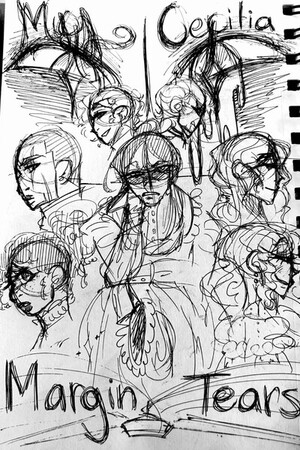Chapter 37:
Investigation
Margin Tears: My Cecilia
The next morning started without warning.
No dawn. No soft pale wash of light seeping across the servants’ windows. Just an abrupt shift—the dark gone, the day inserted like a replacement page in a book. Cecilia woke with a gasp, heart pounding, as though her body had caught the edit mid-stroke. She lay still, listening to the house. It hummed faintly, like a throat clearing before speech.
The lord had warned her. Never disobey. Never defy. And yet, here she was, already hunting for weaknesses.
She rose from the cot, her limbs aching from a night without true rest. The narrow room offered little to comfort her: bare boards, a chipped basin, the mattress that sagged beneath its own thinness. She dressed quickly and slipped into the corridor, her movements hushed though the quarters were alive with the slow rustle of other servants stirring.
But today, she had no intention of following the ordinary schedule.
She had one goal—Find the cracks.
…
At first, it was small things. Cecilia lingered in the laundry, folding linens, her gaze fixed on the steam that curled from the copper vats. The tendrils rose and faded, but not as steam ought to. They drifted in stiff, repeated arcs, like brushstrokes painted over and over. When she reached to touch one, her fingers slid through it—and for a breathless moment, she felt paper-thinness, as though her hand had grazed the underside of a page.
Her pulse quickened. She drew back, the other maids none the wiser, their chatter undisturbed.
Later, in the scullery, she tested her suspicion again. A kitchen cat she had never seen before prowled near the fire, tail twitching. But when Cecilia crouched to stroke its back, her hand slid through warm fur—no resistance, no muscle beneath. The cat blinked once, twice, the same exact blink repeated as though someone had copied and pasted it. She yanked her hand away, heart racing.
It was true. The world here was a story, but stories frayed at their edges.
…
By afternoon she had wandered far from her duties, feigning errands that no one questioned. The manor was too vast, its routines too rigid for anyone to notice one maid slipping through side halls. She moved carefully, listening for footsteps, rehearsing excuses—but her eyes never stopped searching.
She tested shadows: some stretched too far, refusing to move with the light. She touched a mirror in an unused corridor: her reflection lagged a half-second behind, then caught up with a shiver. She passed the library and heard pages turning inside though the room was empty, the sound crisp and hollow like an echo trapped in stone.
Each discovery left her sick with fear, yet also thrumming with a strange exhilaration. Yes, there are flaws. Yes, there are seams. He cannot control it all.
It was nearly dusk—if dusk could be trusted—when she found the most jarring crack of all.
In the west wing, where the tapestries dulled the air with dust, she paused before a tall, arched window. Outside lay the gardens, immaculate and endless… except in one corner. There, where the hedge maze should have been, the world simply ended. Not with a wall or horizon—just a flat, white blur, as though someone had forgotten to paint it. The longer she stared, the more her stomach dropped. The air there did not move. The trees did not sway.
It was unfinished.
Her breath hitched. She reached toward the glass—slowly, slowly—until her fingertips touched it. The surface was colder than ice, and for one dizzying instant, she thought she could feel something pressing back, not from outside but from beneath, as if the glass pane were a barrier between her and some deeper void.
She snatched her hand away, heart hammering in her throat.
It was true—Olrin’s control was vast, but not flawless. He could bend reality, shape it, unmake it. But even he could not hold every detail at once. The story leaked at its edges, and if it leaked, it could be broken.
Cecilia swallowed hard, backing away from the window. The crack was too obvious to linger near. He might sense her there. She forced herself to walk calmly, her shoes tapping against the floorboards, though inside every nerve screamed.
Back in her room, when night fell again without transition, she sat on her bed with fists clenched. Fear had not left her—it was in her bones, crawling under her skin—but alongside it burned something hotter. Resolve.
She whispered it aloud, though the walls might carry her words straight to him:
“You may hold the pen, but the story is not yours alone.”
If she could find more of these cracks, if she could widen them enough to tear this world apart by the spine, she might in turn tear herself free.




Please sign in to leave a comment.